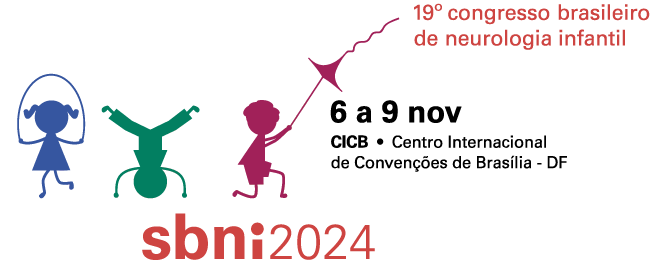Dados do Trabalho
Título
MUTATIONS IN THE GNAI1 GENE CAUSE A NEURODEVELOPMENTAL DISORDER CHARACTERIZED BY GLOBAL DEVELOPMENTAL DELAY, HYPOTONIA, AND ABSENCE OF SPEECH.
Apresentação do caso único
HBLS, a 3-year-old child from non-consanguineous parents, was born late preterm due to premature rupture of membranes. Despite a good birth condition and passing initial neonatal screening, he showed significant developmental delays post-discharge. These delays were marked by axial hypotonia, achieving head control only at 8 months, and delayed speech, with only babbling despite good receptive language. Neuroimaging revealed periventricular hyperintensities, suggesting a hypoxic event. An intensive multidisciplinary rehabilitation program led to developmental gains without milestone regression.
Neurological examination revealed no typical dysmorphic features, but showed significant axial hypotonia and distal hypertonia. This led to an initial diagnosis of non-progressive chronic encephalopathy, possibly pyramidal-extrapyramidal cerebral palsy. However, the clinical presentation was disproportionate to the history and exam findings, prompting genetic testing to explore a possible genetic cause within neurodevelopmental and movement disorders.
Discussão
Expanded exome sequencing identified a potentially pathogenic heterozygous variant in the GNAI1 gene, explaining the condition. G protein subunits (α, β, γ) are linked to neurodevelopmental disorders due to their roles in neuronal development and synaptic function. The GNAI1 gene encodes the inhibitory Gαi1 subunit, which affects central nervous system signaling by inhibiting adenylate cyclase activity. A 2021 study of 27 individuals with GNAI1 variants showed that all had global developmental delays of varying severity. Most exhibited significant speech impairments (91% non-verbal), delays in sitting (86%), hypotonia (87%), severe intellectual disability (55%), and epilepsy (17%).
Comentários finais
The growing accessibility of genetic testing has led to the identification of numerous genes associated with neurodevelopmental disorders (NDDs), which often include developmental delay, epilepsy, and autism spectrum disorder. Mutations in the GNAI1 gene have recently been recognized in such conditions. This case highlights how GNAI1 mutations can present with symptoms similar to cerebral palsy.
Referências
Muir AM, et al. Variants in GNAI1 cause a syndrome associated with variable features including developmental delay, seizures, and hypotonia. Genet Med. 2021 May;23(5):881-887. Kaplanis, J. et al. Evidence for 28 genetic disorders discovered by combining healthcare and research data. Nature. 586, 757–762 (2020) McCudden CR, Hains MD, Kimple RJ, Siderovski DP, Willard FS. G-protein signaling: back to the future. Cell Mol Life Sci. 2005 Mar;62(5):551-77.
Palavras Chave
GNAO1; Neurodevelopmental Delay; EXOME
Área
Neurogenética
Autores
LARISSA BACCOLI DE SOUZA, FLORA CRUZ DE ALMEIDA XIMENES, MARCO ANTÔNIO VELOSO DE ALBUQUERQUE
